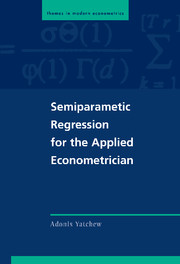Book contents
- Frontmatter
- Contents
- List of Figures and Tables
- Preface
- 1 Introduction to Differencing
- 2 Background and Overview
- 3 Introduction to Smoothing
- 4 Higher-Order Differencing Procedures
- 5 Nonparametric Functions of Several Variables
- 6 Constrained Estimation and Hypothesis Testing
- 7 Index Models and Other Semiparametric Specifications
- 8 Bootstrap Procedures
- Appendixes
- References
- Index
6 - Constrained Estimation and Hypothesis Testing
Published online by Cambridge University Press: 15 December 2009
- Frontmatter
- Contents
- List of Figures and Tables
- Preface
- 1 Introduction to Differencing
- 2 Background and Overview
- 3 Introduction to Smoothing
- 4 Higher-Order Differencing Procedures
- 5 Nonparametric Functions of Several Variables
- 6 Constrained Estimation and Hypothesis Testing
- 7 Index Models and Other Semiparametric Specifications
- 8 Bootstrap Procedures
- Appendixes
- References
- Index
Summary
The Framework
Economic theory rarely dictates a specific functional form. Instead, it typically specifies a collection of potentially related variables and general functional properties of the relationship. For example, economic theory may imply that the impact of a given variable is positive or negative (monotonicity), that doubling of prices and incomes should not alter consumption patterns (homogeneity of degree zero), that a proportionate increase in all inputs will increase output by the same proportion (constant returns to scale or, equivalently, homogeneity of degree one), that the effect of one variable does not depend on the level of another (additive separability), that the relationship possesses certain curvature properties such as concavity or convexity, or that observed consumption patterns result from optimization of utility subject to a budget constraint (the maximization hypothesis).
Empirical investigation is then required to assess whether one or another variable is significant or whether a particular property holds. In parametric regression modeling, a functional form is selected and properties are tested by imposing restrictions on the parameters. However, rejection of a hypothesis may be a consequence of the specific functional form that has been selected (but not implied by economic theory). Thus, although the translog production function is richer and more flexible than the Cobb–Douglas, it may not capture all the interesting features of the production process and may indeed lead to incorrect rejection of restrictions. Nonparametric procedures, on the other hand, provide both richer families of functions and more robust tests for assessing the implications of economic theory. Within this framework it is also possible to test whether a specific parametric form is adequate.
- Type
- Chapter
- Information
- Semiparametric Regression for the Applied Econometrician , pp. 111 - 137Publisher: Cambridge University PressPrint publication year: 2003



